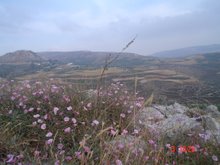Leaving
A few nights ago, after watching a documentary on the violence in
I hope that this nightmare will stay forever in the realm of the subconscious. My greatest fear for this land is that the Americans and Israelis will succeed with their plan to destroy the Palestinians from the inside. If the power-struggle catapults into all-out war, how will people here continue to have even a glimmer of hope to get them through the worst of Israeli ethnic cleansing policies? How will people resist Israeli occupation if their guns are turned on one another?
So this time, in January 2007, leaving
Antonio Gramsci once wrote of the "pessimism of the intellect and the optimism of the will." He could not have better described how I feel today, packing my things to leave my friends in their open air prisons.
My pessimistic side, apparently manifest in my subconscious as well as the nagging thoughts in the forefront of my brain, sees the worst. It knows full well what will happen. The Israelis and Americans will get their wish: the Palestinians will kill one another and this place will spiral out of control. Resistance to the occupation will come to a virtual halt as civic, education, peace and intellectual leaders scramble to put bandages on the US-sponsored gunshot wound to the heart of
In the
My optimistic side, that which allows me to rise in the morning hopeful for a better tomorrow for all of the world, clings to positive developments. Palestinian leaders are calling for calm; they are calling a spade a spade, denouncing nefarious American and Israeli involvement in intra-Palestinian affairs. They are pleading with the factions to end the fighting, and the majority of the Palestinian population (as far as I can tell) support these pleas and add their voices to the cries for solidarity.
In
These things are all well and good. But, as the Palestinians know after nearly sixty years of occupation, talk is cheap. It is time for justice and peace seeking Americans and Israelis to stand up, to denounce firmly the actions of their governments, and to turn the tide away from violence and towards reconciliation. It is the responsibility of people of European descent to combat the racism that lies at the heart of so many of the world’s problems. It is the responsibility of all Americans to end the
Tuesday, January 30, 2007
Saying Goodbye
Leaving Palestine Israel
Subscribe to:
Post Comments (Atom)


No comments:
Post a Comment